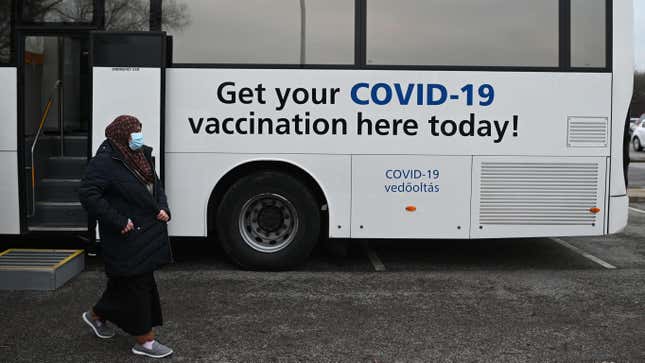
The Omicron variant of the coronavirus is spreading rapidly in the United States. Reported covid-19 cases are sharply rising in highly immunized cities like New York, and experts expect the variant to become the dominant form of the virus seen in the U.S. in as little as a few weeks, following the pattern seen in other countries. Here’s what is known so far, based on preliminary reports—as more research is conducted, our understanding of this variant will evolve.
What Are the Most Common Omicron Symptoms?
Early data from South Africa, where the variant was first discovered in late November (but not necessarily where it originated), and other countries is starting to paint a clearer picture of the trouble Omicron can cause. It’s infecting people who have a baseline of immunity, either from previous vaccination or infection, but its typical symptoms also appear, at least so far, to be milder on average. A case study of an Omicron-specific outbreak among people in Norway—the vast majority of whom were fully vaccinated—found, for instance, that early symptoms predominantly included sore throat and a runny or stuffy nose, along with dry cough and fatigue. Interestingly enough, that same study found that only 12% reported a loss of smell, which was previously known to be a very common symptom of covid-19. In South Africa, fewer hospitalizations and deaths have been associated with their recent Omicron wave than with past peaks, including from Delta.
There is lab data suggesting that Omicron can grow very rapidly in the cells of our upper respiratory tract but not as well in our lungs. This might help explain why Omicron is so fast-spreading and why it doesn’t seem to cause as much serious illness. However, it’s too early to know whether Omicron is inherently milder than older strains of the virus. Because so much of the world has been exposed to some version of the coronavirus, either through infection or vaccination, the milder presentation we’re seeing so far may not hold true for unexposed people.
Omicron does still pose a major threat, experts have warned. Though the average person may be fine after contracting Omicron, its sheer spread will lead to many people getting sick at once, which could strain local healthcare systems. At least some of those people won’t fare as well as everyone else, especially if they’re in poorer health and/or not previously exposed. At this point, we also don’t know the likelihood of people experiencing chronic symptoms after Omicron, a condition known as long covid. Even if only a small percentage of people do develop lingering symptoms, that could still amount to many cases in total.
When Should You Get Tested?
If you’ve been around someone who had covid-19, you may be wondering how soon you can get tested to find out if you caught the virus. The good news is that Omicron isn’t so inherently different from past variants that tests aren’t picking it up. But there is some data from South Africa suggesting that symptoms can appear sooner following exposure—also known as the incubation period—compared to previous strains. Omicron symptoms could be showing up after three to four days on average, compared to the average five-day incubation period seen before. So that might be the time to get tested with PCR if you’re afraid you’ve been exposed to Omicron.
Even if you test negative soon after exposure to an infected person, subsequent tests may still be prudent, since some infections may only become detectable a week or more after exposure. Rapid tests still seem to be effective at detecting when a person is most infectious and able to spread the virus to others, but there is some speculation that rapid tests may not identify infection as quickly as before. So if you are relying on these tests, it may be more important than ever to take the test immediately before you plan to visit someone, not a day or many hours earlier. And if you’re feeling sick, you should try to stay home regardless, if possible.
How Effective Are the Vaccines and Boosters Against Omicron?
It’s clear by now that our vaccines aren’t providing as much protection against infection from Omicron as past strains. But that doesn’t mean they’re not helping. Multiple studies have shown that booster shots do seem to significantly restore effectiveness against Omicron, at least temporarily.
New data from vaccine maker Moderna out Monday, for instance, looked at people’s neutralizing antibody levels against Omicron before and a month after they received a booster dose. Some were given the standard 50-microgram booster dose (half of the full dose used in the two-series vaccine), while others were given a 100-microgram dose. Compared to pre-booster levels, levels rose 37-fold in those who got the standard booster dose, with an 83-fold for those who got the 100-microgram booster.
There are caveats here. The experiments used pseudovirus meant to look like Omicron, which may not be an exact match for how our boosted immunity will respond to the real thing. That said, some early real-world data from the UK’s covid-19 surveillance program has indicated the strength of the booster. They compared the likelihood of people in the UK coming down with Delta or Omicron, depending on their vaccination status, and found that the booster may restore protection against illness from Omicron to around 70% to 75%; it may offer even higher protection against severe illness.
Companies like Moderna are developing Omicron-specific boosters, but they may not arrive for some time, and who knows what the situation might look like then (in the past, variant-specific boosters were outdated before they could conceivably reach the market, supplanted by newer strains that became dominant). So in the immediate future, getting boosted is probably the most impactful thing you can do for yourself to stay safe this winter.